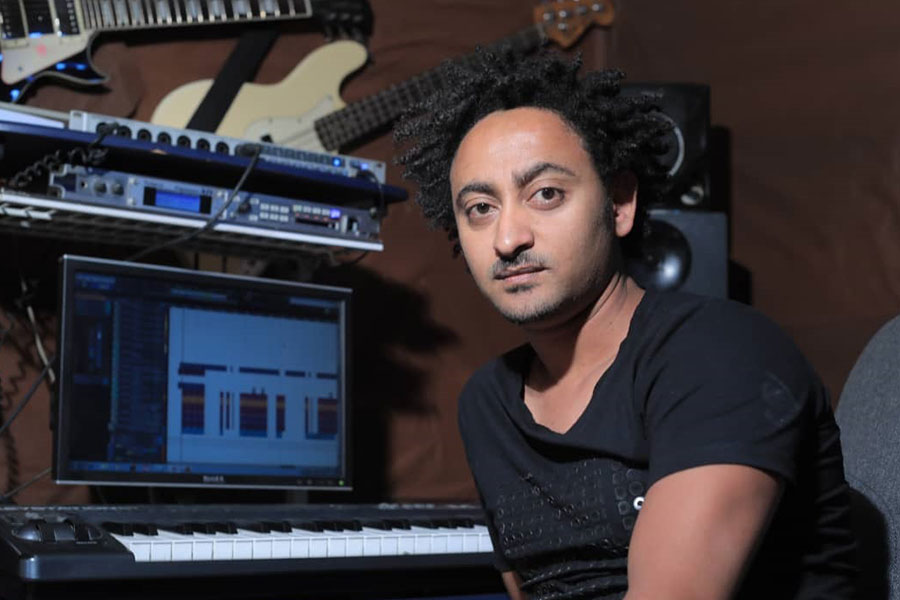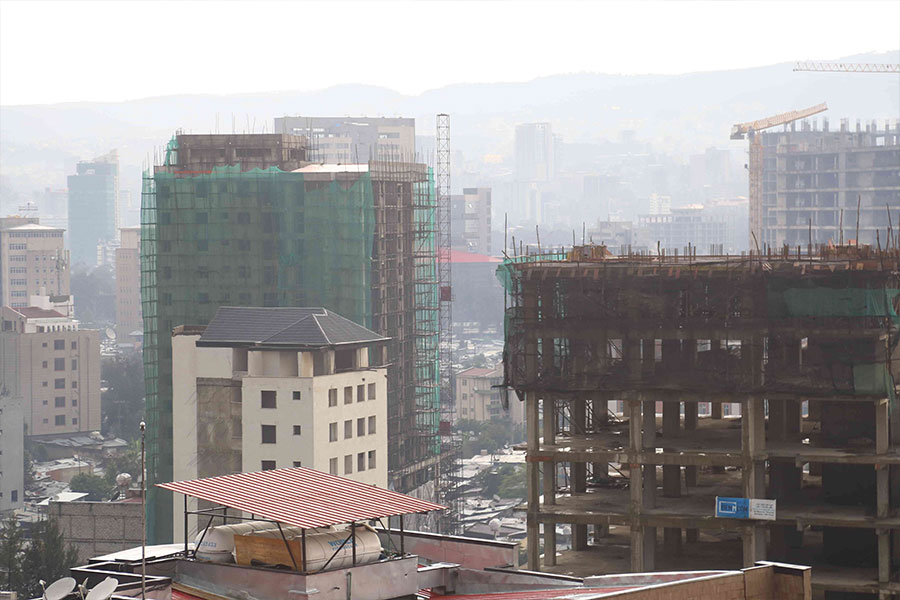
Fortune News | Jan 28,2023
The morning of December 10, 2020, saw the usual flurry of activity at Très Bien Dermatology Speciality Clinic, one of the pioneers of hair transplant services in Ethiopia. Men of different ages were eagerly awaiting their turn to consult for hair restoration treatment or to receive their monthly check-ups.
Among the waiting customers is a 28-year-old man who underwent the hair transplant procedure four months ago. He related that he decided to do it, because he was constantly worrying about his thinning hair and often contemplated his fear of going bald at a young age.
"I could feel my hair getting less dense even when I washed it," he said, wishing to remain anonymous.
He had not informed his family about his decision to have the surgery, nor were they aware it had happened even after the procedure was performed successfully.
"When I went to visit my family after a while, they thought I had just shaved my head," said the young man.
His family had no idea that such a thing as a hair transplant even existed.
"Now, they understand the procedure well, and they often call to ask me how my hair is doing," he said.
Though it has only recently taken root in Ethiopia, the medical procedure for hair transplantation was first introduced to the world in the 1950s in the United States. The modern transplant method now widely used worldwide is referred to as follicular unit transplantation and was developed in the 1990s.
Even though people are often skeptical or doubtful about the hair transplant procedure, it is fairly simple. The transplanted hair is all-natural, taken from the patient's own head.
Before surgery, the "donor area," the region of the scalp not affected by whatever caused the hair loss, is trimmed short or shaved for ease of access. Next, the performing professional removes small punch grafts from the hair-bearing scalp or donor area and cuts them into smaller pieces to use as grafts. These grafts are then carefully relocated to a bald or thinning area of the scalp. The new hair starts to grow naturally, and patients are normally expected to have full, thick hair within a year to a year-and-a-half after undergoing the procedure.
Hair growth four months following a transplant procedure.
Research indicates infections, crust or pus drainage around the surgical sites, scalp pain, itching, swelling and losing sensation around the surgical sites as possible side effects of hair restoration surgeries.
"Hair transplant is a simple procedure but needs to be administered in a medical facility under meticulous control," said the general manager of Marcia Surgical Centre, one of the first hair transplant service providers in Addis.
Marcia Surgical Centre is a renowned practice owned and led by Tewodros Mesele (MD), a plastic and reconstructive surgeon. Marcia has been operating in Ethiopia under a different business name (Icon) for the past 15 years. The Centre provides plastic and reconstruction surgery, as well as orthopaedic and general surgery. In March 2020, the Centre expanded its services to include hair transplantation and restoration.
After making an appointment at Marcia, customers receive consultation on the overall process of hair transplantation. Several laboratory tests for things like Hepatitis C and B are then carried out to ascertain whether the patient is capable of receiving the transplant or not. Following laboratory tests, the area of the patient's scalp that needs a transplant is measured.
Prices are set based on this area's measurement, and the average price for the whole process is around 65,000 Br, including follow-up. Ethiopian and Turkish professionals perform the transplant under the supervision of Tewodros. A single transplantation session might take six to eight hours. The Centre provides transplant services for beards and eyebrows as well.
Messay Zewdie, a 43-year-old man who received his hair transplant seven months ago, is one of Marcia's customers.
“I used to feel insecure when I was in my twenties," he said. "Then I got used to it, and I never paid much attention."
But after having seen a friend of his undergo a successful transplant in Turkey, a common destination for Ethiopians seeking the procedure, he began to contemplate getting one himself. When the local hair transplant clinics began to open up, and after considering that the cost of getting a hair transplant here in Ethiopia would be far less than in Turkey, he decided to give it a shot.
“My wife was against the idea of getting a transplant. But now that it's all grown," he said, "she has come to like it."
Although Messay was not actively concerned about his balding hair, he does notice the change the transplant has made in his everyday life. He observed that the number of people who refer to him as an older man has decreased. Messay also feels as if his new appearance has given him a few years of his life back.
Très Bien Dermatology Specialty Clinic was also established in March 2020. Très Bien provides various kinds of dermatological treatment, including hair transplant services. Once customers arrive, Kidist Yeneneh (MD), a dermatology specialist, performs physical, microscopic, and laboratory examinations to determine the cause of hair loss.
This process is meant to identify what kind of hair restoration treatment the patient needs. Not every kind of baldness can be treated with a hair transplant.
"A simple example, loss of hair due to cancer treatment or liver complications cannot be treated with transplantation as the cause is hormonal," said Kidist. "Even if the transplant were performed, the new hair would again fall out."
Once the primary examination stage is complete, patients will wait to be called in to undergo the procedure when the experienced Turkish hair transplant specialists arrive. At Très Bien, a hair transplant procedure's cost can range from 60,000 Br to 80,000 Br on average. The price includes monthly follow-up appointments, consultation, and haircare packages consisting of products such as shampoos and creams.
Kidist examines five to six hair transplant patients a day.
Most of the customers from Marcia and Très Bien are men; however, women are also paying frequent visits and usually inquire about forehead hair and eyebrow transplants.
Another entity that has joined the hair transplant market is Restore Tech Hair Transplant & Medical Spa. The company offers the hair transplant procedure along with other standard spa services like acupuncture and massages.
Regardless of the fact that the cost of a hair transplant is greater than what the average Ethiopian earns in a year, there is a remarkable amount of demand at these centres.
Beauty plays a role in the formation of our identity, according to Seble Hailu, a psychologist and general manager at Endaee Communication Consultancy Counseling & Training Services.
"We identify ourselves as beautiful or plain, and we think our appearance determines how people perceive us," said Seble. "It's an attempt for people to fit into the beauty standard they have set for themselves," she explained.
Seble also added that, in her experience, people who undergo cosmetic surgery tend to feel more whole, confident and satisfied with themselves.
According to her, because of the social tendency to make inappropriate comments about appearances that do not fit the popular standard, those who decide to undergo a hair transplant could find themselves subjected to verbal ridicule.
"However, getting a hair transplant is a choice people make," she said, "hence they will have the psychological preparedness to endure any mockery that might come their way."
Although several companies are engaged in the business, the legitimacy of some of the institutions is questionable. The Addis Abeba Food & Drugs Authority, which is in charge of providing licenses to hospitals and health centres, stated that it had only issued licenses to perform hair transplant services to two entities, Marcia Surgical Centre and Hallelujah General Hospital, as of December 18, 2020.
Even though the Authority has not yet modified its procedures to specify details regarding the establishment and operation of hair transplant services, it maintains that the service cannot be provided as a stand-alone procedure.
Operation of pre-established plastic surgery or dermatology specialty practices is required to receive permission to provide hair transplant services. However, licenses for specialty clinics, such as Très Bien, are issued under the respective district's food and drugs office.
In spite of this, officials from the Authority are not sure that Très Bien has been approved to provide hair transplantation services. The officials also say that Restore Tech might not qualify to operate as a transplant centre since hair restoration is licensed only under medical facilities and Restore Tech seems to be registered as a spa.
The Authority does not take the illegal provision of health services lightly, according to Debrework Getachew, deputy director of the Addis Abeba Medicine Registration & Licensing Bureau.
"In the context of our country, hair transplantation cannot be provided anywhere else but certified health centres," she said. "This is done for the well-being of society."
Très Bien and Restore Tech have declined to comment about the status of their licensing and operational permits.
Although Hallelujah General Hospital has been awarded a permit, it has not yet begun providing hair transplant services.
PUBLISHED ON
Jan 03,2021 [ VOL
21 , NO
1079]

Fortune News | Jan 28,2023

Radar | Oct 01,2022

Agenda | Mar 11,2023

Radar | Mar 07,2020

Radar | Jun 29,2019

Featured |

Radar | Sep 18,2021

Advertorials | May 22,2025

Fortune News | Aug 30,2025

Fortune News | Dec 21,2022

Dec 22 , 2024 . By TIZITA SHEWAFERAW
Charged with transforming colossal state-owned enterprises into modern and competitiv...

Aug 18 , 2024 . By AKSAH ITALO
Although predictable Yonas Zerihun's job in the ride-hailing service is not immune to...

Jul 28 , 2024 . By TIZITA SHEWAFERAW
Unhabitual, perhaps too many, Samuel Gebreyohannes, 38, used to occasionally enjoy a couple of beers at breakfast. However, he recently swit...

Jul 13 , 2024 . By AKSAH ITALO
Investors who rely on tractors, trucks, and field vehicles for commuting, transporting commodities, and f...

Oct 18 , 2025
The political establishment, notably the ruling party and its top brass, has become p...

Oct 11 , 2025
Ladislas Farago, a roving Associated Press (AP) correspondent, arrived in Ethiopia in...

Oct 4 , 2025
Eyob Tekalegn (PhD) had been in the Governor's chair for only weeks when, on Septembe...

Sep 27 , 2025
Four years into an experiment with “shock therapy” in education, the national moo...